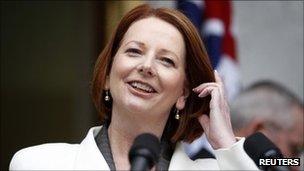Australia parliament passes divisive carbon tax
- Published
- comments

The carbon tax vote is an important victory for Prime Minister Julia Gillard
Australia's lower house of parliament has narrowly passed a bill for a controversial carbon tax.
The legislation would force about 500 of the biggest polluters to pay for each tonne of carbon dioxide they emit.
The tax is central to the government's strategy to combat climate change, but the opposition says it will cause job losses and raise the cost of living.
Australia is the world's largest coal exporter and one of the biggest per capita greenhouse gas emitters.
"Today is a significant day for Australians and the Australians of the future who want to see a better environment," Prime Minister Julia Gillard said before the vote.
After her Clean Energy Bill 2011 was passed with 74 votes for and 72 against, she hugged colleagues and waved to supporters in the public galleries.
Along with a companion bill for A$300m ($298m; £191m) in assistance for the Australian steel industry, it is expected to pass the Senate with the help of the Greens next month.
Protests
The victory is an important one for the prime minister, whose popularity with voters in opinion polls has been declining against the opposition.
The bill has polarised Australian opinion. Thousands of people have protested against it, accusing Ms Gillard of lying before last year's election.
Two previous failed attempts to pass similar bills were partly responsible for the fall of her predecessor as prime minister and Labor Party leader, Kevin Rudd.
Ms Gillard made a pledge during last year's federal election not to introduce a carbon tax.
The proposed tax was drawn up after Ms Gillard failed to win an overall majority in parliament at the polls and had to rely on the support of the Greens.
Australia's 500 heaviest polluters will pay A$23 for each tonne of carbon emissions.
The government says nine out of 10 households will be compensated through tax cuts or welfare increases for any increased costs, but the opposition says 60% will be worse off.
The tax will be introduced on 1 July next year, and will then evolve into an emissions trading scheme three years later.
The conservative opposition leader, Tony Abbott, has promised to ditch the tax if he wins office.
- Published17 August 2011
- Published11 July 2011
- Published30 May 2011
- Published30 May 2011